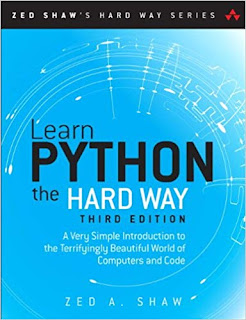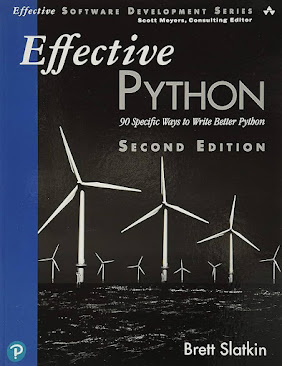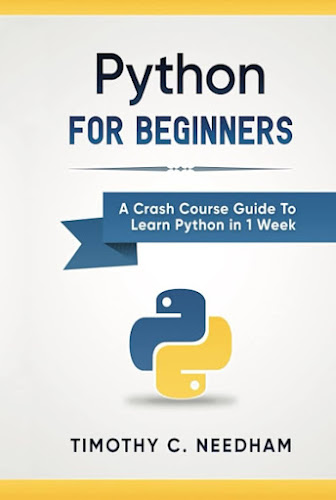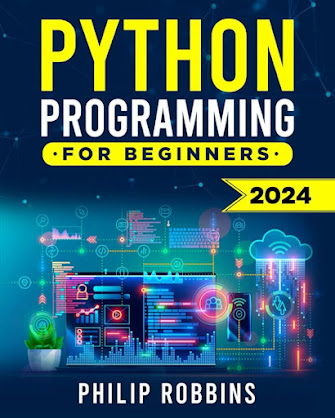Hello guys, if you want to learn Python and looking for the best Python books then you have come to the right place. In the past, I have shared the best Python 3 courses, best websites to learn Python, Python Developer RoadMap, Python questions for interviews, and today, I am going to share the best books to learn Python programming in 2025. Whether you are an AI expert or a Computer Science student, you will come across Python Programming language sooner or later in your career. Starting its journey in 1991, Python has now captured the Programming world. Started as just a scripting solution for trivial stuff, Python is now everywhere.
With its excellent libraries and frameworks, Python is driving Data Science, Web Development, Machine Learning, Server Side development, Automation, and General Programming stuff, and that's why it makes sense to Learn Python.
Unlike some programming languages like Java or C++, which is good for server-side and complex programs but not suitable for simple things, because of its excellent libraries and vibrant community, you can do almost everything using Python from object-oriented programming to writing simple scripts.
Being an author of a technical blog and editor of a Medium publication (see), I often receive queries like what is the best way to learn Python? Which are the best books to learn Python? Which online courses should I join to learn Python, etc.?
While online courses are great to start with, and I did share some of the best Python online courses before, I feel, books still have their place. They are the most comprehensive and authoritative source of knowledge for any technology, and Python is no different.
Even if you don't know anything about Python, you can use these books to kick-start your Python career, I have specially chosen books that promote hands-on learning and are easy for beginners to follow on and a few titles for advanced Python programmers to explore further.
Once you find your feet using an online course like The Complete Python 3 Bootcamp, you can dig deeper into the massive world of Python by following these books.
It will straightway teach you all practical stuff like sending an email notification, reading files, appending into XLS, scrapping data on the web, and automating trivial things using Python without you spending days and night learning sorting algorithms, object-oriented programming, and all kinds of computer science stuff.
If you are someone who learns by doing real things, then this book is for you. Another great thing is that author Al Sweigart has also created an online course on Udemy with the same title "Automate the Boring Stuff with Python Programming," so if you want to listen to him for more active learning you can also join that course along with reading this book.
This was one of the books which were suggested to me by my Python buddy, but I didn't get a chance to look because I was more hooked with the "Automating Boring Stuff with Python" and "Head First Python" book. I did read it later and learned a lot from it as it fills many gaps in my learning.
Reading books from multiple authors also helps you to grasp the concept better because some explain one topic better while others explain other topics. If you like Zed A. Shaw learning a hard way approach, then you will love this book. I also suggest combining this with this Python Programming MasterClass to get the best of both worlds.
If for some reason, you won't be able to connect with AI Sweigart, author of the first Python book on this list, then you should try this one.
It's a fast-paced, thorough introduction to Python that will have you writing programs, solving problems, and making things that work in no time. If you want to combine with an online course, I suggest you join the Python for Everybody course on Coursera, which is just amazing and goes nice with these books.
Their unique style not only encourages you to read the book for a long time without getting bored but also pushes you to do stuff along the way.
This work and fun model also helps you to retain the knowledge. When it comes to the subject matter, the book is great for beginners but not as practical as the "Python Crash Course" or "Automating Boring Stuff with Python" book, but it still is a very good book to start learning Python.
In this updated edition, Luciano Ramalho invites Python developers to move beyond basic productivity and explore the language's full potential. The book provides hands-on guidance on writing effective, modern Python 3 code by emphasizing best practices and idiomatic features. Ramalho delves into Python's core language elements, libraries, and advanced concepts, offering insights on making code shorter, faster, and more readable.
The new edition is structured into five parts, functioning as individual books within the book, covering diverse topics such as data structures, functions as objects, object-oriented idioms, control flow, and metaprogramming.
This comprehensive guide is tailored to developers looking to deepen their understanding of Python, enabling them to apply its features more effectively and adopt a clear and concise programming style.
This is also my favorite book for advanced Python programmers, as it will help you to learn the best techniques to write better Python programs. Applying the lessons from the book will help you to write a clearer, shorter, and faster Python code for your real-world Python Projects.
While online courses are great to start with, and I did share some of the best Python online courses before, I feel, books still have their place. They are the most comprehensive and authoritative source of knowledge for any technology, and Python is no different.
Even if you don't know anything about Python, you can use these books to kick-start your Python career, I have specially chosen books that promote hands-on learning and are easy for beginners to follow on and a few titles for advanced Python programmers to explore further.
Once you find your feet using an online course like The Complete Python 3 Bootcamp, you can dig deeper into the massive world of Python by following these books.
8 Best Python Books for Beginners and Experienced in 2025
So, without wasting any more of your time, let's start with some of the best books to learn Python for beginners and intermediate developers:1. Automating Boring Stuff with Python
This is the first book I had read along with Head First Python when I started learning Python a couple of years back. Since then, this is my go-to book for Python. I started learning Python to automate a few things, and the title got me, but I didn't get disappointed as the book truly lives the title.It will straightway teach you all practical stuff like sending an email notification, reading files, appending into XLS, scrapping data on the web, and automating trivial things using Python without you spending days and night learning sorting algorithms, object-oriented programming, and all kinds of computer science stuff.
If you are someone who learns by doing real things, then this book is for you. Another great thing is that author Al Sweigart has also created an online course on Udemy with the same title "Automate the Boring Stuff with Python Programming," so if you want to listen to him for more active learning you can also join that course along with reading this book.
2. Learn Python The Hard Way, by Zed A. Shaw
If you ask about a Python book for beginners, a lot of people will recommend "Learn Python The Hard Way, by Zed A. Shaw," and this happens to me as well.This was one of the books which were suggested to me by my Python buddy, but I didn't get a chance to look because I was more hooked with the "Automating Boring Stuff with Python" and "Head First Python" book. I did read it later and learned a lot from it as it fills many gaps in my learning.
Reading books from multiple authors also helps you to grasp the concept better because some explain one topic better while others explain other topics. If you like Zed A. Shaw learning a hard way approach, then you will love this book. I also suggest combining this with this Python Programming MasterClass to get the best of both worlds.
3. Python Crash Course
The Python Crash Course: A Hands-On, Project-Based Introduction to Programming, by Eric Matthes, is another awesome, hands-on book to learn Python, and it's very much like the first book in this list.If for some reason, you won't be able to connect with AI Sweigart, author of the first Python book on this list, then you should try this one.
It's a fast-paced, thorough introduction to Python that will have you writing programs, solving problems, and making things that work in no time. If you want to combine with an online course, I suggest you join the Python for Everybody course on Coursera, which is just amazing and goes nice with these books.
4. Head First Python: A Brain-Friendly Guide, by Paul Barry
Well, this is the book that has taught me Python. I am a big fan of the Head First series of books and having gone through most of their best-sellers like Head First Java and Head First Design Pattern, I really like the way they make learning fun.Their unique style not only encourages you to read the book for a long time without getting bored but also pushes you to do stuff along the way.
This work and fun model also helps you to retain the knowledge. When it comes to the subject matter, the book is great for beginners but not as practical as the "Python Crash Course" or "Automating Boring Stuff with Python" book, but it still is a very good book to start learning Python.
5. Fluent Python: Clear, Concise, and Effective Programming, by Luciano Ramalho
"Fluent Python: Clear, Concise, and Effective Programming 2nd Edition" by Luciano Ramalho stands as a highly acclaimed guide with a stellar 4.8 out of 5 stars from 353 ratings, earning the title of #1 Best Seller in Object-Oriented Design on Amazon.In this updated edition, Luciano Ramalho invites Python developers to move beyond basic productivity and explore the language's full potential. The book provides hands-on guidance on writing effective, modern Python 3 code by emphasizing best practices and idiomatic features. Ramalho delves into Python's core language elements, libraries, and advanced concepts, offering insights on making code shorter, faster, and more readable.
The new edition is structured into five parts, functioning as individual books within the book, covering diverse topics such as data structures, functions as objects, object-oriented idioms, control flow, and metaprogramming.
This comprehensive guide is tailored to developers looking to deepen their understanding of Python, enabling them to apply its features more effectively and adopt a clear and concise programming style.
Now, there is also the second edition of this book available which will help you to learn Python better.
It's like Effective Java for Python Programmers, and if you need more advice, you can combine this book with "Python Tricks: A Buffet of Awesome Python Features" by Dan Bader, other awesome books to learn some advanced Python tips.
6. Effective Python: 90 Specific Ways to Write Better Python (Effective Software Development Series)
"Effective Python: 90 Specific Ways to Write Better Python (Effective Software Development Series) 2nd Edition" by Brett Slatkin stands as an indispensable resource for Python developers, earning a remarkable 4.7 out of 5 stars from 407 ratings.As part of the Effective Software Development series, this updated and expanded edition is tailored for Python 3, offering valuable insights to help developers harness the full power of Python and write robust, high-performing code. Drawing from his extensive experience building Python infrastructure at Google, Slatkin introduces 90 Python best practices, tips, and shortcuts using a concise, scenario-driven style.
The book addresses common pitfalls and nuances of the language, guiding developers to adopt a truly "Pythonic" approach. With realistic code examples and detailed explanations, Slatkin covers key areas such as statements, expressions, built-in types, functions, comprehensions, generator functions, classes, interfaces, metaclasses, concurrency, parallelism, debugging, testing, and collaborative development.
This edition also includes 30 new actionable guidelines, reflecting the evolution of best practices in the Python ecosystem.
Whether you're a seasoned Python developer or just starting, "Effective Python" prepares programmers to make a significant impact by mastering the languages' nuances and best practices. You can also combine this book with Google IT Automation with Python professional certificate to learn more practical usage of Python.
7. Python for Beginners: A Crash Course Guide to Learn Python in 1 Week
"Python for Beginners: A Crash Course Guide to Learn Python in 1 Week" by Timothy C. Needham, narrated by Zac Aleman, is a comprehensive audiobook designed to make Python programming accessible to learners of all levels.Boasting a 4.3 out of 5 stars rating from 3,744 reviews, this audiobook provides a stress-free introduction to Python, focusing on its simplicity and power. Timothy C. Needham guides listeners through a seven-day learning journey, emphasizing hands-on experience to solidify concepts and paradigms of programming.
The audiobook covers essential topics such as installing Python, working with Python glossary, interacting with Python, using Turtle for drawing, understanding variables, loops, native Python datatypes, dictionaries, boolean logic, conditional statements, constructing 'while' and 'for' loops, and creating classes and defining objects.
The structured approach makes it ideal for total beginners with zero programming experience, returning professionals, or seasoned individuals seeking a fast and straightforward crash course in Python.
With practical examples and clear explanations, this audiobook is a valuable resource for those eager to grasp Python fundamentals in just one week. If you need an online course to go along with this book, I recommend you to join 100 Days of Code: The Complete Python Pro Bootcamp for 2025 course by Angela Yu. This course will teach you Python by building 100 projects in 100 days. Along the way, you will also learn data science, automation, build websites, games and apps!
With a noteworthy 4.3 out of 5 stars from 404 reviews and the tag of #1 Best Seller in Functional Software Programming, this book is tailored for those seeking to enhance work-life balance and explore new job opportunities in the ever-expanding field of programming.
Philip Robbins emphasizes the importance of Python, the most sought-after programming language globally, particularly in the post-pandemic age where remote and non-remote programming positions have proliferated.
The book adopts a learner-friendly approach, focusing on synthesis, simplicity, and practicality. It covers essential topics like installing Python, understanding Object-Oriented Programming (OOP) principles, maximizing script efficiency, and delves into advanced programming concepts like Github, pip, Virtual Environment, and Unit Testing.
With practical codes, exercises, and bonus content on Python interview questions and answers, this guide is suitable for both beginners and those with some programming experience. Whether you've never written a line of code or are looking to advance your programming skills,
For active learning, you can also combine this book with the "Introduction to Python" course from Datacamp which is very active and engaging. This will also help you to learn Python better and quicker.
"Python Programming for Beginners" is positioned to open doors to new, high-paying job opportunities, making it a valuable resource for anyone aspiring to land their dream job in the realm of Python programming.
That's all about some of the best books to learn Python in 2025 and beyond. These are some of the timeless Python books and deserve a place in every serious Python programmer's bookshelf. No matter whether you are doing Data Science with Python or creating a web application using Django or Flask, learning Python programming better will only make you a better Python developer.
If you are serious about learning Python in-depth, here are some more free and paid resources for Further Learning
- 10 Reasons to learn Python in 2025
- 15 Free Python Programming Courses for Beginners
- The 2025 Web Developer RoadMap
- Top 5 Web Development Frameworks for Python Developers
- Python vs. JavaScript - Which is better to start with?
- 10 Free Online courses to learn Python in depth
- Top 8 Python libraries for Data Science and Machine Learning
- Python vs. Java - Which Programming language Beginners should learn?
- 5 Data Science and Machine Learning course in Python
- 10 Python Courses and Certifications For Programmers
- Top 5 Python books to learn Data Science
- 10 Free Python Programming Books for Programmers
- 8 Python Projects for Beginners to learn Python
- Why Python is the best Programming language for Data Science
- Top 5 Websites to learn Python Coding for FREE
Thanks for reading this article so far. If you like these best Python books, then please share this article with your friends and colleagues. If you have any questions or feedback, then please drop a note, and if you have a Python book which I should read, feel free to share it with us.
P. S. - If you prefer interactive reading and learn-by-doing rather than reading books or watching videos then you can also take a look at CodeCademy Learn Python 3 course, it's an awesome course to learn Python by doing. It's part of their Pro Package but worth learning.








Any book which you recommend to learn Python for Data Science and Machine Learning?
ReplyDelete